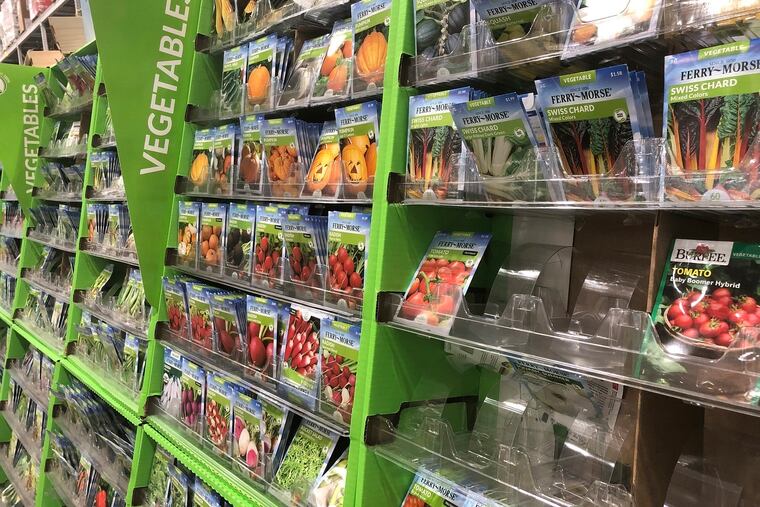If you want a robust spring garden, start shopping for seeds now
Times of economic and political turmoil have the predictable effect of turning people to the garden plot, principally to generate food but also to remain grounded in uncertain periods.

Times of economic and political turmoil have the predictable effect of turning people to the garden plot, principally to generate food but also to remain grounded in uncertain periods.
This response was seen during both world wars, the Depression, and in the immediate aftermath of the Great Recession of the late 2000s. A figure that sticks with me is that during World War II, as much as 40% of the nation’s produce came from victory gardens.
Another great crisis is upon us, and in March, the coronavirus pandemic induced a tsunami of demand for vegetable seeds. It was something the seed catalogs could not see coming, though they worked hard to get seeds to consumers, even if the selection of varieties was limited.
You might think it was fortuitous that the pandemic occurred at the threshold of spring and the growing season. But in a normal year, March is at the tail end of seed-buying season. Typically, home gardeners are knocking on seed companies’ doors now, having spent the holidays salivating over seed catalogs, a surprising number of which are still printed and mailed.
» READ MORE: Philly garden activists are shipping millions of seeds to a nation fretting over food access
Time to plan your plot
Another aspect of preparing for spring and beyond is putting your garden together over the next two months, as much as you can in winter, so everything is ready when seeds need to germinate and get growing.
I suspect some of last year's new gardeners will walk away from their pandemic hobby, now knowing that a needy cucumber vine is not like a piece of knitting that you can put down and get back to at your convenience. But some will stick with it, and others will join our cult, for all the good reasons to do so.
The impetus for March’s seed rush was the fear of food shortages — for millions of Americans, that became a reality — but the value of gardening unfolded in additional ways. New and old gardeners alike cherished the way the backyard or community garden offered a place of mental and physical refuge. Refuge, one hoped, from the virus and from the political angst.
» READ MORE: Chalk it up to boredom or fear, but victory gardens are growing again
Try something new
The current seed season also seems abnormally busy, with companies telling customers to expect some delays in seed shipments. There are already instances of seed packets being either out of stock or back-ordered.
The first seed company I tried, Baker Creek Heirloom Seeds, had stopped taking orders temporarily, so it could catch up, though another catalog I contacted, Kitchen Garden Seeds, had what I needed. The point is, this is going to be another big year for seed sales, and prudence suggests you order early.
The uncertainties can force varietal stick-in-the-muds such as myself to try new things. I'm looking forward to growing a cherry tomato named Orange Pixie; it has large fruit for a cherry type, but it's a small, three-foot plant whose tomatoes ripen in one go rather than sequentially. This suits my practice of yanking tomatoes in August to make room for the fall garden.
I love sweet peppers as much as I dislike hot ones, and I was drawn to the Diamond bell pepper, if only because the photo shows a fruit that seems crafted from alabaster. The ivory color matures to a less-interesting red. After all these years, I am still a sucker for an alluring catalog picture and a convincing description, a weakness that seems forgivable in the depths of winter.
» READ MORE: A community gardens guide to Philly, from getting wait-listed to planting your plot
Vegetable garden tips
Veggie seeds fall into two basic types: those you start indoors ahead of the season, and those you sow directly into the garden. The first includes tomatoes, eggplants and peppers, the second such things as beets, carrots and corn. Some can be treated either way, certainly in the Mid-Atlantic, where the growing season is long and the soil ready for squash seeds by Memorial Day.
Of the varieties that are sown directly into the garden, timing differs. In early spring, when the soil is still cool, you can sow lettuce and carrots and arugula, for instance, but other seeds must wait until the soil has warmed, in mid- to late spring. The latter group includes directly sown cucurbits, okra and most beans.
Every aspect of successful vegetable gardening is about timing. If you are thinking about starting a vegetable garden this year or expanding what you have, you should be taking advantage of mild winter days to build it, particularly if you have to add fencing against deer and rabbits.
Vegetables need good soil, and the easiest way to provide that is to build wooden frames, tethered to the ground and backfilled with screened compost, leaf mold, sand, etc. The frame has to be on ground that is flat or is made flat, and in a sunny location.